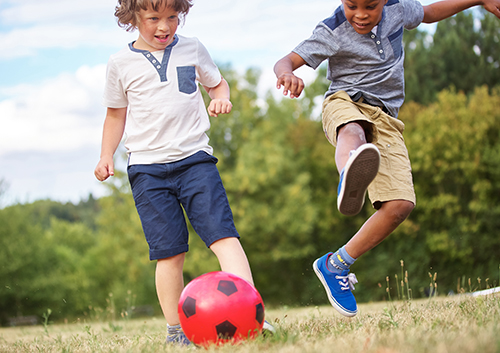Summer Sports and Mouthguards
July 6th, 2022

School’s out and you’ve emptied your gym locker until next fall. But while you’re stowing away the football gear, the basketball warm-ups, the field hockey sticks, and all the other equipment you’ve collected over the school year (that’s where that other shoe went!), be sure to keep one item handy: your mouthguard.
Team and contact sports like football, basketball, and wrestling aren’t the only potential dental dangers. In fact, almost any sport or activity can be made safer when you use your mouthguard. While you’re keeping active and fit in the summer months, remember to look out for your smile.
- Sports on wheels
Biking, skate boarding, rollerblading—it only takes one fall to make you realize that roads, sidewalks, and concrete are not ideal landing pads. If you do take a spill, using a mouthguard, along with your helmet, will help protect your teeth and jaw.
- Court sports
Handball and tennis are not what we consider contact sports, but an unexpected bounce from a ball, or a completely unexpected backhand from your partner, can lead to dental injuries. Ace your workout and wear a mouthguard.
- Water sports
A fall in the water can lead to a collision with your surfboard or water skis, and water polo often seems to be a game of stamina, accuracy and elbows. Wear your mouthguard on land and sea, and help reduce your chance of dental injury.
- Team sports
Anyone who has played summer league baseball, softball or soccer knows that occasional contact with other players is pretty much a given. Cushioning your head, mouth, and teeth with a mouthguard will not only protect you, but keep you in the game—and your teammates will appreciate that!
If you already use a mouthguard, keep up the good work! If you don’t, talk to Dr. Irwin Seidman about the importance of protecting your smile with a mouthguard. There are ready-made options available at drug stores and sporting goods shops. These will provide protection to your mouth and teeth, but can sometimes be bulky and uncomfortable and should never be used with braces. If you would like a mouth protector that provides the best fit and comfort, or if you wear braces, we can customize a mouthguard in our Palatine, IL office that will be a perfect fit for your teeth and bite.
Whatever activity you choose, play it smart! Don’t gear up without your mouthguard, and you’ll greet next year’s classes energized, fit, and sporting a beautiful smile!





 Website Powered by Sesame 24-7™
Website Powered by Sesame 24-7™